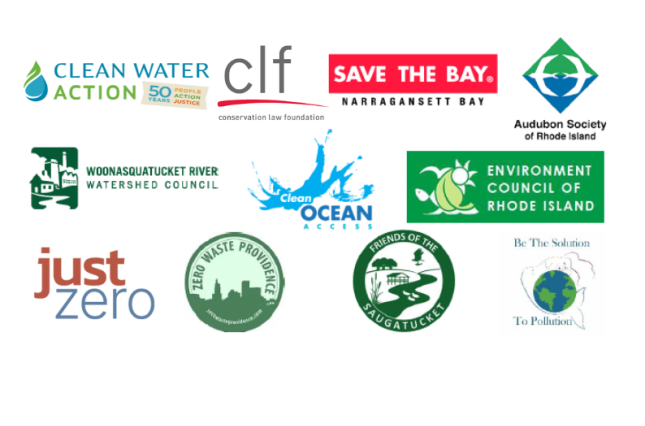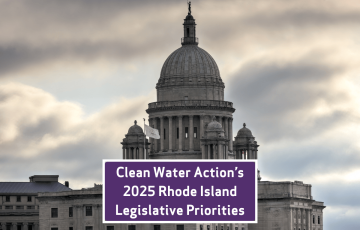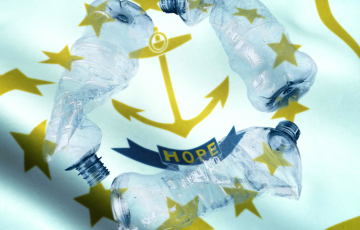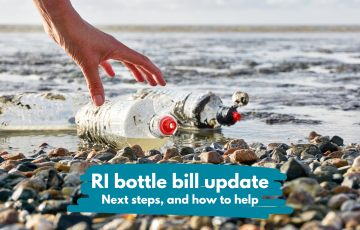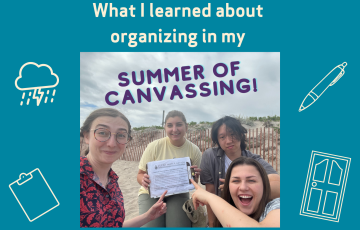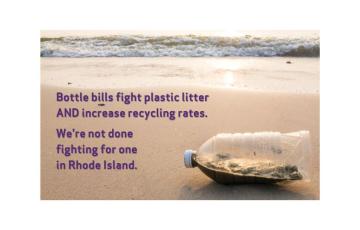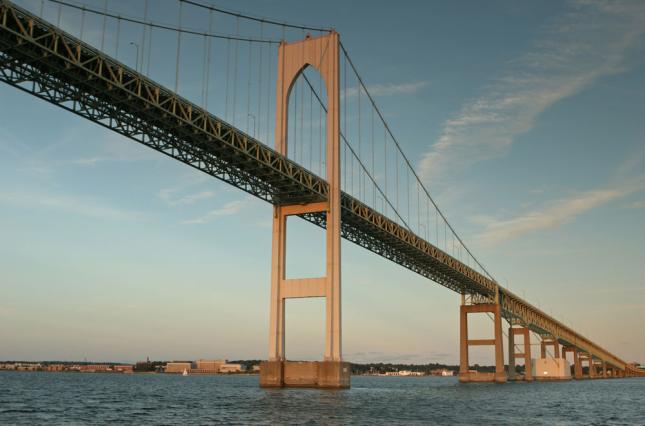

Plastic bottles and other beverage containers are littering our neighborhoods, clogging storm drains, polluting our waterways, and piling up in the landfill. Luckily, 10 states, including our neighbors in Massachusetts and Connecticut, are currently modeling a solution: a recycling refund law, or “bottle bill”.
Learn More
↓
The Single-Use Beverage Container Problem:
Beverage bottles are littering our neighborhoods, clogging storm drains, polluting our waterways, piling up in the landfill, and breaking down into microplastic bits in the Bay. Unfortunately, curbside recycling is not effectively capturing this waste stream.
Despite decades of anti-littering efforts and an increase in access to single-stream recycling in the state, litter and marine debris continue to be a persistent and growing environmental problem, both along the shore and in our inland communities. Over 33,000 beverage containers — and beverage container pieces — were removed from RI’s shore during the 2022 International Coastal Cleanup event. And local watershed volunteers across the state collected over 80,000 miniature alcohol containers — or “nips” — in 2023 alone. Beverage containers routinely clog our stormwater collection systems, and microplastics can now be found in nearly every waterbody in the state.
At the same time, our recycling system is failing to meet the state’s recycling targets, and tons of recyclable beverage containers are buried in the landfill each year. Much of the material we think is being recycled isn’t. For example, all of the glass currently captured by our recycling system in RI is actually buried at the landfill, and most of the plastic isn’t turned into new bottles but is “downcycled” into lesser materials.
In short: What we’re doing isn’t working. We need to do better.
The Solution? A Bottle Bill
Ten states, including our neighbors in Massachusetts and Connecticut, are currently modeling a solution: a recycling refund law, or “bottle bill”. In states with a bottle bill, customers pay a small deposit on each container they purchase which is returned to them when they bring the empty bottle back to a participating retailer or redemption center to be recycled. The costs of handling the empty containers are paid for by the beverage companies or distributors in the form of a handling fee.
A strong bottle bill will increase recycling rates, reduce litter, fight plastic pollution in our waterways, and incentivize the beverage industry to implement a more sustainable model with bottles and containers that are easier to recycle or even reuse.
Benefits of a Bottle Bill:
- States with bottle bills have a higher rate of recycling because consumers are incentivized by the deposit to make sure that containers are properly returned. Nine of the ten states with the highest rate of recycling are bottle bill states.
- The containers collected in a recycling refund system are cleaner and better sorted than those collected by curbside recycling, so they are more likely to be recycled into a product of the same quality rather than downcycled (made into a lower quality product), incinerated, or sent to the landfill. Right now in Rhode Island, all of the glass that is “recycled” is not actually being turned into new bottles but is instead being used as landfill cover or in road construction. A strong bottle bill makes it more likely that the same raw material will be made into a bottle again!
- With a bottle bill, recycling bottles on the go is easier and more convenient. When retail locations are also redemption centers, customers have options to properly recycle beverage containers when they aren’t at home, which is where many single-use beverage containers are used.
Bottle bills reduce litter! When every empty bottle has a value attached to it, people are less likely to toss them away and more likely to pick bottles up off the ground.
Additionally, a recycling refund program can also become a system for REUSING bottles. Not long ago, glass soda bottles and milk bottles, for example, were returned for reuse. We don’t need to settle for a system where we pollute local waterways to extract raw materials to make a beverage bottle,drink from that bottle for ten minutes, and then pollute yet another community when the bottle is disposed of or tossed on the ground. We need to move towards a sustainable, circular economy.
Download our printable 2025 RI Bottle Bill Half-Page Fact Sheet (Download the PDF)
Take Action! Ask your legislators to support the Bottle Bill here.
Read media coverage of the campaign:
Could RI finally have a bottle recycling bill? Here are the options | Providence Journal | Alex Kuffner | April 12, 2025
Study Commission Recommends R.I. Implement Both Bottle Bill and Extended Producer Responsibility Program | EcoRI News | Rob Smith | April 11, 2025
Bottle bills bubble up in R.I. General Assembly | Rhode Island Current | Christopher Shea | April 10, 2025
Letter to the editor: Bottle bill would improve recycling | Cranston Herald | Emily Howe | March 12, 2025
Could this be the year of a bottle bill in RI? Survey shows strong support | Providence Journal | Alex Kuffner | March 7, 2025
Eleventh hour bottle bill reignites debate between environmental, business groups | Rhode Island Current | Nancy Lavin | June 5, 2024
New Bottle Bill Lands in House; Would Add 10-Cent Deposit on Beverage Containers, Including Nips | ecoRI News | Mary Lhowe | May 30, 2024
Chances of a bottle-redemption bill passing this year look slim | The Providence Journal | Alex Kuffner | May 18, 2024
Would a bottle bill work in RI? Advocates look to Oregon for the example | The Providence Journnal | March 14, 2024
Rhode Island continues to push for a bottle bill | The Brown Daily Herald | Haley Sandlow and Julia Vaz | October 27, 2023
Tons of recyclables end up in the landfill. What experts say is needed to fix the problem. | The Providence Journal | Alex Kuffner | October 25, 2023
Study shows shocking amount of microplastics in Bay. Here's what we can do to help | Opinion | Jed Thorp and Mike Jarbeau | The Providence Journal | September 23, 2023
RI lawmakers must pass the bottle bill. Here's why. | Opinion | Jed Thorp and Mara Shulman | The Providence Journal | May 20, 2023
Lawmakers nip bill to recycle tiny liquor bottles for this year. Here's what's next. | The Providence Journal | Patrick Anderson | June 9, 2023
Bottle recycling bill canned, for now - Lawmakers will study deposit-refund program through special panel | Rhode Island Current | Nancy Lavin | June 12, 2023
Pushing for the bottle bill: An interview with Clean Water Action's Jed Thorp | A Lively Experiment | March 24, 2023
Will a 10¢ bottle rebate cut down on litter and fix RI's recycling system? Critics think so | The Providence Journal | Alex Kuffner | March 11, 2023
Supporters Rally to Push New Bottle Bill, Promising Less Litter and More Money for Recycling | ecoRI News | Mary Lhowe | March 11, 2023
Advocates renew push for bottle bill at State House rally | Uprise RI | Steve Ahlquist | March 10, 2023
R.I. representatives introduce ‘bottle bill’ for plastic-free waterways | The Brown Daily Herald | Mahin Ashfaq | March 9, 2023
Recycling in RI is lagging, but could a bottle bill help? The Providence Journal | Alex Kuffner | February 8th, 2023
Environmentalists ask McKee to support bottle bill. WPRI | T.J. Del Santo | January 26th, 2023
Environmental groups urge McKee to back ‘bottle bill’ to fight litter. The Boston Globe | Edward Fitzpatrick | January 20th, 2023
For more information:
From the RI Resource Recovery Corporation: Rhode Island recycling rates by city/town
From the Department of Environmental Management and RIRRC: RI 2023 report on waste and recycling
Read ReLoop’s report: “Reimagining the Bottle Bill”
Read the Conservation Law Foundation’s report: “The Big Beverage Playbook For Avoiding Responsibility”
Read TOMRA’s report: “Rewarding Recycling”
From the New York Times: “Beverage Companies Embrace Recycling, Until It Costs Them”
Edwards, Sarah and Sydnee Grushack, “The 50 States of Recycling,” March 2021
“2020 National Litter Study: Summary Report,” Keep America Beautiful, May 2021
